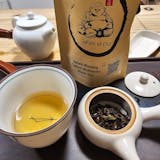One day, when the refreshing moments of spring had long passed, a young monk approached Lao Cha:
— Sensei, I often reminisce about those lovely spring days sitting under the blooming cherry trees. Those days when we would enjoy sweet rice cakes and hot tea, savoring the aroma of the sakura petals dancing around us.
— Take a sip of my latest creation.
"Koucha" is the Japanese word used for black tea. Like "hong cha", "koucha" translates as "red tea", referred to as black tea in the West. Wakoucha is specifically black tea produced in Japan, "Wa" referring to Japan in this context. The unique Japanese cultivars give this tea its distinctive, mild character and soft taste.
Our Award-winning Organic Sakura Wakoucha is grown in Yame, Fukuoka prefecture. A small number of farms produce limited amounts of koucha throughout Japan. In fact, most tea grown in Japan is green tea, while most black tea is imported from abroad. And wakoucha, being a local tea, is enjoyed almost exclusively by Japanese tea enthusiasts.
The taste of this Japanese black tea is spectacular. Taking a sip of our Sakura Wakoucha, you will submerge in a juicy sweetness void of astringency. A lingering, slightly floral taste will remain on the palate. Notes of succulent cherries and honey will follow, subsiding in a superb, long-lasting finish. The color of the liquor is a comforting apricot-orange hue. Our Japanese Sakura Black Tea makes a perfect afternoon drink and pairs well with desserts.
Wakoucha is a fully oxidized tea. The leaves undergo a long process of withering (up to 20 hours). The next step is rolling, where the leaves are pressed in a circular motion. It helps release the inner moisture and further oxidize the leaves. The leaves are then placed in large sieves and shaken up and down to prevent entanglement during the filtering stage. Repeated kneading comes next, which further breaks the cell walls, followed by another stage of oxidation for 2-3 hours. After that, farmers dry the leaves with hot air in the drying phase and add cherry tree leaves. The result is a delicate, honey-floral tea with fruity notes and a higher sweetness that lingers in the mouth, leaving a lasting impression for hours.
Produced by tea farmer Harashima-san, this tea won the prestigious Nihoncha Award in 2017.
Brewing guidelines:
![]() 195℉ / 90℃ for the first infusion; Keep raising water temperature for subsequent infusions
195℉ / 90℃ for the first infusion; Keep raising water temperature for subsequent infusions
![]() 1g per 60ml
1g per 60ml
![]() 2min for the first infusion; then 30sec; +15 for each subsequent infusion
2min for the first infusion; then 30sec; +15 for each subsequent infusion




